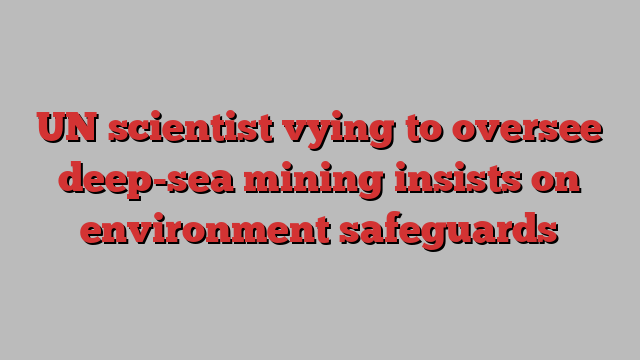
Unlock the Editor’s Digest for free
Roula Khalaf, Editor of the FT, selects her favourite stories in this weekly newsletter.
A top UN marine scientist running to lead the global body that governs seabed mining has said no company should be granted a licence before clear safeguards are in place, staking out the most distinct pro-conservation stance in this week’s election for the post.
Allowing unregulated exploitation of the ocean floor risked causing “damage” without “any mechanism to stop the harm”, said Leticia Carvalho, a Brazilian oceanographer and head of the UN’s marine and freshwater branch.
Carvalho’s bid to head the International Seabed Authority (ISA) comes after the publication in the journal Nature Geoscience last month of what she branded “mind-blowing” research suggesting ocean floor metals electrically produced life-giving “dark oxygen”.
Environmentalists have seized on the findings as evidence of the unknown dangers of seabed mining, while The Metals Company (TMC), which has the most advanced plans to exploit minerals from the seabed, has disputed the results.
The Canadian group, which part-funded the research, plans to file the first application to mine in international waters to the UN-backed regulator by the end of the year. It aims to produce metals by early 2026, even though diplomats have so far failed to agree guardrails on issues of taxation, royalties, liability and environmental protection.
Deepsea mining advocates say it is the only way for the west to challenge China’s dominance in critical minerals used in clean energy technologies, such as nickel, cobalt and copper, and that the environmental harm is lower than terrestrial mining.
At the core of the debate is a controversial ISA rule, under which it must adopt exploitation regulations within two years of a request that it do so from any member state — something Nauru, TMC’s sponsoring nation, triggered in 2021.
Any company that wants to exploit minerals in international waters needs a sponsoring state, which is obliged to ensure the company follows the rules.
Even if no such regulations are adopted, the ISA must “consider” and “provisionally approve” applications made following that two-year period — terms over which there is a political and legal debate.
“I don’t believe a business, any business at that scale, with that relevance, can start without the regulatory basis well settled and agreed,” Carvalho told the Financial Times, ahead of the election due to take place on Friday.
Michael Lodge, who is running to secure a third term as ISA secretary-general, said the regulator was still on course to agree a rule book for deep-sea mining by 2025. Last year, member states deferred the decision but agreed they did not want exploitation to start in the absence of rules.
The British lawyer, who is seen by some diplomats as being pro-mining, has previously said a moratorium on seabed mining would be “anti-science, anti-knowledge, anti-development and anti-international law”.
In response to his critics, he said the election was “a decision for the assembly” of the ISA’s 169 member states and that he had always defended the “mandate of the ISA, based on best environmental science” and taken a precautionary approach.
A new dimension in the process is the “dark oxygen” finding that an electrical charge associated with metallic nodules on the sunlight-deprived sea floor can split water into its constituent elements, hydrogen and oxygen. It had previously been thought the gas in the oceans came solely from organisms that — as on land — use light to turn carbon dioxide into oxygen through photosynthesis.
“I think this is the biggest paradigm shift in deep-sea science I’ve ever seen,” Murray Roberts, a professor of marine biology at the University of Edinburgh, said on social media.
TMC has issued a forceful rebuttal, claiming that other journals had refused to publish the paper and that the samples were contaminated by seawater. It said rival papers had found net oxygen consumption, rather than production, on the seabed.
The researchers issued an equally strong defence of their work. Since publication, they had been contacted by other scientists who had found similar data but had not believed it, said Prof Andrew Sweetman, leader of the research.
“My co-authors and I stand fully behind the findings in this research paper,” said Sweetman of the Scottish Association for Marine Science. “We would welcome future peer-reviewed studies that further investigate this phenomenon”.
Carvalho said that transparency and balance were key parts of her pitch. She added that she would serve as an arbiter between cutting-edge science, corporate interests and states’ competing positions, despite Brazil supporting a 10-year precautionary pause on seabed mining.